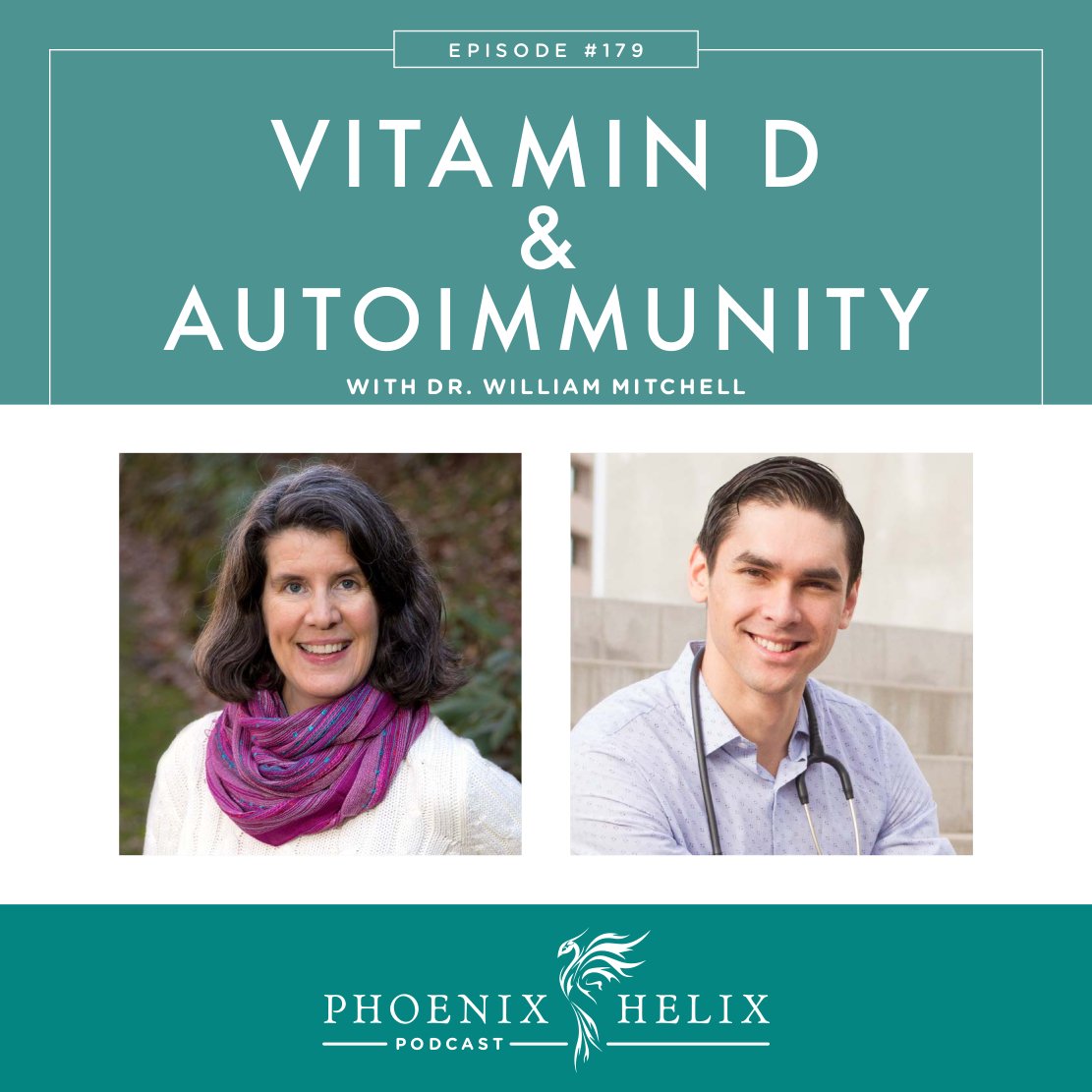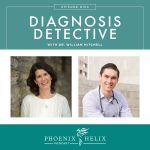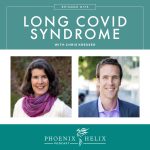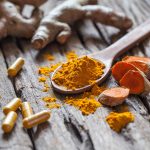Vitamin D: Sunshine vs. Supplement
Vitamin D is one of the most commonly recommended supplements for people with autoimmune disease, because it’s essential to immune system regulation. How do you know if you’re deficient? When is sunshine the best source, and when is supplementing a better option? Can you take too much vitamin D? We’ll be answering these questions and more in today’s podcast. My guest is Dr. William Mitchell, a naturopathic doctor whose expertise is autoimmune disease.
Listen to the Show
- Subscribe to my podcast through your favorite podcast app: iTunes, Stitcher, Google, TuneIn, Spotify, Amazon, etc.
- You can also listen to the episode right here through the player below, and if you subscribe to my newsletter you’ll get notified of future episodes.
Podcast: Play in new window | Download
Show Notes
- Intro (0:00)
- Meet Dr. William Mitchell
- Dr. Mitchell is a naturopathic doctor who works in an integrative rheumatology clinic.
- Listen to my prior interview with Dr. Mitchell: Ep. 150 – Diagnosis Detective.
- Thank You To Our Podcast Sponsor – Araza Beauty (2:01)
- Our skin absorbs what we put on it, so it’s wise to read product labels, just as we read the labels on food. Sadly, makeup often contains some of the most toxic chemicals. Araza Beauty uses ingredients that actually nourish your skin. Their products are guaranteed to be free of synthetic ingredients, artificial colors, fragrances, gluten, and GMO’s. In fact, they’re the world’s first paleo certified makeup brand.
- While natural makeup often has a reputation for not working well, Araza is known for great pigmentation and blendability.
- Today, I’d like to highlight their bestselling, All In One Coconut Cream Foundation. It’s the ultimate skin protector by offering 25 SPF from non-nano zinc oxide. It also blocks artificial blue-light and protects against pollution. Lastly, it includes a post-biotic that balances your skin’s natural microbiome. It comes in 24 different skin tones, and they have a guide to help you find the right tone for you. They also sell sample sizes.
- This is just one of their products. They also sell eye shadow, lip color, cheek color, and more. Be sure to check out their whole product line.
- To learn more, visit ArazaBeauty.com/phoenixhelix, and use the code HELIX for 15% off your first order.
- Why Is Vitamin D So Essential? (4:05)
- While some people see it as a panacea that can cure all things, that’s not true. However, it does have two very important roles.
- The health of our teeth and bones depend on vitamin D, because it plays an important role in calcium economy – working with our body’s organs to absorb calcium from food and circulate in the body to use as needed.
- Vitamin D is also essential to immune system health. Our immune system has two branches: innate (which is the first, general response against pathogens) and humoral (which is specific and has a memory, developing antibodies against specific threats). Vitamin D makes our innate immune system more effective, and helps maintain balance between both branches which is essential to autoimmune health. Vitamin D also stimulates the creation of cathelicidin on our skin, which is a natural antimicrobial and helps with host defense. (To learn more about how the immune system works, listen to Podcast Ep. 166 – Autoimmunity 101.)
- Sunshine: The Natural Source of Vitamin D (9:56)
- Vitamin D is unique, because our body is designed to make it in response to sunshine.
- While it’s called a vitamin, it’s actually a steroid hormone, and cholesterol is the building block.
- Cholesterol accumulates naturally in our skin. Sunshine’s UVB rays interact with that cholesterol to create vitamin D and other metabolites (which we know less about, but likely have benefits as well). Vitamin D once created in our skin, moves to the bloodstream and is converted by the liver and kidneys into its active form, and circulates to fulfill its roles in our bodies.
- Resource: How Vitamin D is Made.
- Autoimmune Responses to Sunshine (11:34)
- Photosensitivity: This is when UV light can trigger inflammation, including serious flares in some circumstances. This is a common symptom among lupus patients. Sunshine can be dangerous in those circumstances. People with severe photosensitivity can even be sensitive to indoor fluorescent light.
- Heat intolerance: This is when heat can trigger inflammation and a temporary increase in symptoms. This is common among MS patients.
- Medication reactions: some medications can cause photosensitivity, including certain antibiotics, antihistamines, anti-inflammatories, as well as some autoimmune medications like methotrexate. Check with your pharmacist to see if any of your medications carry this risk.
- Beneficial responses: Many people with autoimmune disease tolerate sunshine well, so we don’t want to scare people away from sunshine unnecessarily. When tolerated, sunshine can offer both physical and mental health benefits. Some people even experience improvement in their autoimmune symptoms. For example, many people with psoriasis find that sunshine reduces lesions.
- Before trying to get vitamin D from sunshine, talk with your physician to make sure you aren’t vulnerable to negative reactions.
- Optimizing Vitamin D from Sunshine (16:15)
- The season matters: summer, late spring, and early fall offer the best conditions for making vitamin D from sunshine.
- Time of day matters: Mid-day is best, because it provides the best angle of the UVB rays to activate vitamin D creation.
- Skin tone influences how long it takes. Fairer skin makes vitamin D faster than darker skin.
- The more skin exposed, the faster you will create vitamin D as well. That said, having your arms and legs exposed is often enough. You don’t have to wear a bikini to make vitamin D.
- Once your body creates its daily dose of vitamin D, it’s done. Staying in the sun longer won’t make more vitamin D. Look for a light pinking of the skin – that’s often the signal that vitamin D has been created. But avoid sunburns – those increase skin cancer risk. If you want to stay in the sun for hours, use a natural sunscreen or wear sun protective clothing.
- Resource: D Minder is an app that tracks these factors for you and helps determine how much time to spend in the sun to make your vitamin D for the day.
- Vitamin D in Foods (20:10)
- Most foods don’t offer any vitamin D, and the foods that do, only have small amounts. Without sunshine or supplement, most people would be deficient in vitamin D if food was their only source.
- Foods that contain vitamin D: egg yolks, oily seafood, oysters, and mushrooms. The good news is that these foods are healthy for other reasons. Consider vitamin D an extra benefit.
- Dr. Mitchell believes in the power of a real food diet and eating nose-to-tail, but not every patient follows this recommendation. For patients who include processed food in their diet, sometimes there are products fortified with vitamin D that can boost the body’s levels.
- Testing Vitamin D Levels (22:19)
- Dr. Mitchell uses a standard 25 hydroxy vitamin D amino assay. It tests for total serum levels of vitamin D.
- In the past he did more complex testing, including parathyroid hormone levels and different variants of active vitamin D. But those tests are expensive and he doesn’t think they provide vital information. Instead, he looks at patient symptoms combined with the standard test, and finds that to be a very effective measure.
- Vitamin D Level Recommendations (23:30)
- Conventional Medicine
- Deficiency = anything under 10
- Insufficiency = anything under 20
- Sufficiency = 30 and above
- Toxicity = 100 and above
- Optimal Levels Recommended in Functional Medicine
- Recommendations vary widely among practitioners. Some recommend 30-40, others 50-70, and others try to get their patients up to 100.
- Many practitioners like Dr. Mitchell and Chris Kresser (a prominent name in the functional medicine community) have changed their recommendations with emerging research showing that higher levels can have some harmful effects, long before toxicity is reached. Dr. Mitchell also monitored his patients and saw no added benefit at higher levels.
- Dr. Mitchell now recommends 30-40 for his patients. That’s enough to be sufficient, without risking any harm.
- Conventional Medicine
- Thank You to Our Podcast Sponsor – ShopAIP (28:30)
- Today I’m highlighting KC Natural’s line of condiments. It’s summer in the Northern Hemisphere, and for many us, that means cookouts! KC Natural has created AIP-friendly options for the condiments you miss the most. That includes ketchup, mustard, barbecue sauce, salsa, marinara sauce, and spice rubs as well. You can buy a bundle to try them all, or choose your favorites individually.
- ShopAIP is an online store dedicated to the Paleo Autoimmune Protocol. With hundreds of items for the elimination phase of the AIP, and new products labeled by reintroduction category as well. You can find protein bars, sauces and condiments, AIP-friendly spices, cooking and baking ingredients, waffle and pancake mix, delicious snacks, and more.
- If you’re a first-time customer, use the code PHOENIX for 10% off your order. Purchase here.
- Symptoms of Vitamin D Deficiency (29:37)
- Aches, pains, myalgia – bodywide or centered on the shoulders and hips.
- Fatigue.
- Brain fog.
- Mood disturbance, depression.
- These symptoms can overlap with autoimmune symptoms, but if you’re deficient in vitamin D, it’s likely playing a role. It might even be the main root cause behind these symptoms.
- Symptoms of Vitamin D Toxicity (30:51)
- Dizziness.
- Bone pain.
- Nausea.
- Increased liver enzymes (which shows up on ALT & AST blood tests).
- However, you don’t always feel symptoms, which is why you need to monitor vitamin D levels if you’re taking a supplement. Vitamin D is a fat-soluble vitamin that the body can’t excrete. Instead, any excess gets stored in the body’s tissues, and that can cause health problems both short-term and long-term.
- Root Causes of Low Vitamin D (32:25)
- Lack of sunshine.
- Inflammation can convert vitamin D faster than usual, causing lower levels.
- Certain medications can also lower vitamin D levels (corticosteroids, diuretics, seizure medications, diabetes medications, and blood pressure medications).
- With patients who are just suboptimal (20-30) rather than truly deficient – their vitamin D levels often rebound simply by addressing inflammation.
- Patients with vitamin D levels below 20 often need supplementation in addition to anti-inflammatory protocols.
- Resource article on Dr. Mitchell’s website.
- Sunshine’s Benefits Beyond Vitamin D (37:02)
- If you don’t have a negative reaction to sunshine (photosensitivity, heat intolerance), that is Dr. Mitchell’s preferred source of vitamin D for his patients.
- Sunshine offers a host of benefits in addition to vitamin D.
- It releases nitric oxide from the skin, which benefits the cardiovascular system.
- It stimulates the release of seratonin, which is wonderful for mood and brain chemistry. Seasonal affective disorder is a form of depression caused by lack of sunlight.
- It creates other metabolites in the body that benefit the immune system and general health.
- Resource: Benefits of Sunlight: A Bright Spot for Human Health.
- What To Look For in a Vitamin D Supplement (39:43)
- If you are deficient in vitamin D and can’t tolerate sunshine, a supplement is the next best source.
- Supplements might also be a good choice if your lifestyle doesn’t allow for much time in the sun.
- D3 vs. D2 – D3 is the form of vitamin D that circulates in our own bodies. D3 supplements are usually sourced from lanolin collected from sheepskin. D2 supplements are sourced from plants and must be converted by our bodies. For that reason, Dr. Mitchell prefers D3 supplements, but research shows that D2 supplements can be effective as well.
- Some healthcare professionals recommend getting a supplement with synergistic nutrients like vitamins A & K. Dr. Mitchell says the research doesn’t support that recommendation, so a plain vitamin D supplement is what he recommends for his patients.
- Two brands he likes are Doctor’s Best and Jarrow.
- Consult with your doctor on your dose. It will depend on how deficient you are, the medications you’re taking, your overall health, and how frequently your vitamin D levels will be monitored through repeat testing.
- Vitamin D Side Effects (43:02)
- Most people tolerate vitamin D well. You’re more likely to have side effects at high doses. The most common ones would be gastrointestinal disturbances, nausea, etc.
- Anecdotally, Eileen does well with sunshine but gets side effects from vitamin D supplementation (headaches and hormone imbalances).
- Tune in, know your body, and communicate with your doctor if you notice any negatives.
- Outro (48:21)
- Dr. William Mitchell works in an integrative rheumatology clinic in Scottsdale, AZ alongside a rheumatologist and nurse practitioner. He’s accepting new patients who can visit his practice in-person. For telehealth, he does general consultations but cannot diagnose or treat.
- Eileen (your podcast host) is the author of multiple books, written to help people thrive with autoimmune disease. Learn more on the Books Page.
- If you like this podcast, follow or subscribe through your favorite podcast app. You can also subscribe to Eileen’s biweekly newsletter.
- Check out the entire archive of podcast episodes.
You May Also Be Interested In
Spreading the Word
If you like the podcast, please leave a positive review in iTunes. It would mean the world to me, and also helps others find the podcast. Here are some quick instructions using your iPhone:
- If you are already subscribed to my podcast: (1) Click the purple podcast icon. (2) At the bottom of the screen, click Library. (3) At the top of the screen, click Shows. (4) Click the Phoenix Helix podcast image. (5) Scroll down the page, and you’ll see Ratings and Reviews. Scroll down a little bit more and click on Write a Review. This will bring up the review screen. Tap 5 stars (if you love the podcast), and then click in the title box, and it will bring up the keyboard. Enter a title and short review. (6) Click Send in the upper right corner. (7) Thank you! Positive reviews give the podcast a higher search ranking in iTunes, helping people find it and letting them know it’s a quality podcast and worth their time to listen.
- If you haven’t subscribed to my podcast: (1) Click the purple podcast icon. (2) In the lower right corner, click the magnifying class. (3) Type Phoenix Helix in the search box. (4) Click the podcast cover in the Show list. (5) If you’d like to subscribe, click the + sign at the top of the screen. (6) To write a review, scroll down the page, and you’ll see Ratings and Reviews. Scroll down a little bit more and click on Write a Review. This will bring up the review screen. Tap 5 stars (if you love the podcast), and then click in the title box, and it will bring up the keyboard. Enter a title and short review. (7) Click Send in the upper right corner. (8) Thank you! Positive reviews give the podcast a higher search ranking in iTunes, helping people find it and letting them know it’s a quality podcast and worth their time to listen.








